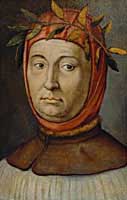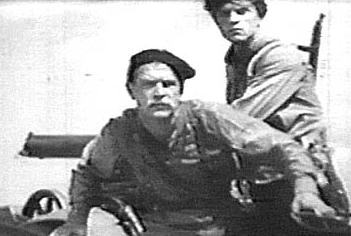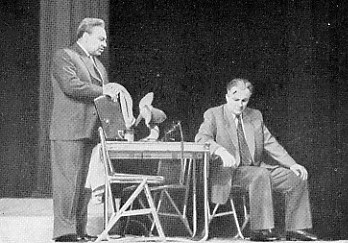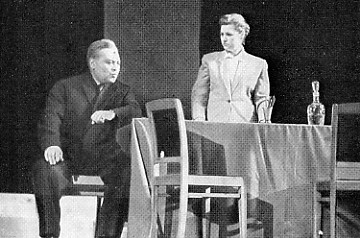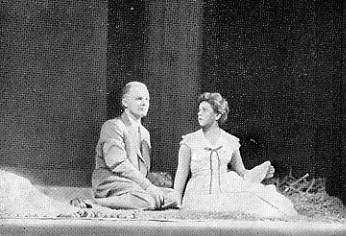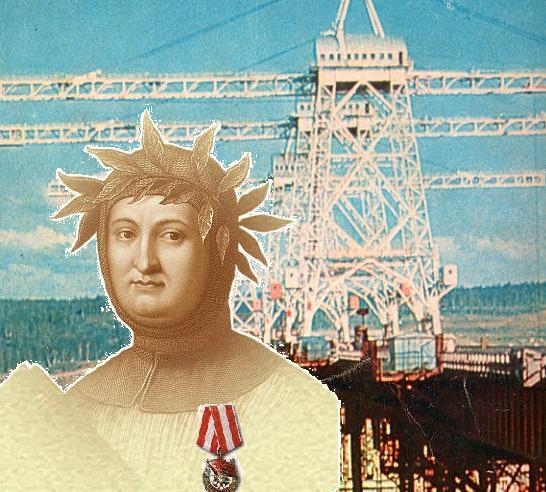

Center for Thaw Studies
presents a detailed summary of:
PETRARCH'S SONNET
by
Nikolai Pogodin
(1956)
ACT ONE, SCENE ONE
It is May in a new Siberian town. Dmitri Sukhodolov, a middle-aged construction foreman from Moscow, has been working here for six months. He is strolling in a park and bumps into an old friend, Yakov Armando, a renowned violinist, who is currently on tour in Siberia.
Armando notices something different about Sukhodolov--he seems brighter and happier. Sukhodolov confides in Armando that, although he is a married man, he has fallen in love with a beautiful young girl from Leningrad named Maya, who is on temporary assignment in the local library.
Since meeting Maya, Sukhodolov finds it easier to breathe, he treats people better, and feels true inspiration in his work. Sukhodolov does not expect that the relation will develop physically, but he writes adoring letters to Maya, in which he calls her "his song".
PETRARCH
Italian scholar, poet, and
humanist of the Renaissance,
whose works influenced
Boccaccio and Shakespeare.
He developed a chaste love
for a woman known only as
Laura, to whom he dedicated
many poems and sonnets.
See:
Francesco Petrarch -
Father of Humanism
Armando says Sukhodolov is like Petrarch, and his letters to Maya are like Petrarch's sonnets to Laura.
ACT ONE, SCENE TWO
Armando gives a concert. All are thrilled by his playing, although some wonder why he is looking so shabby--it's his artistic temperament says Kseniya Petrovna, Sukhodolov's wife; it's because he drinks too much suggests Pavel Mihailovich, an oblast Party official.
Maya is at the concert with her friend, Klara. During the intermission, Maya seems to be looking around for someone. Klara asks suspiciously who it is. Maya says it's a secret. All she will say is that she is driven by something similar to the music at the concert--pure feeling.
Klara presses Maya to confess what she's up to, asserting that Maya has individualistic and subjective attributes, which make Klara worried about her as a comrade.
Klara sees Pavel and hurries up to him. She says she's found materials casting shame on Sukhodolov, specifically his letters to Maya in which he calls her "his song". Klara found the letters hidden among Maya's things, made copies of them, and put the originals back so that Maya would suspect nothing.
Pavel says he does not want to see the letters, since they are private business between Maya and Sukhodolov. Klara mutters in angry disbelief about Pavel's liberalism.
Maya and Sukhodolov see each other. He asks her if she finds his letters silly. She says, no, they are wonderful. He whispers to her that she should destroy them. She objects to this suggestion, saying that the letters are pure poetry. "I have not been authorized to write poetry," he tells her. Maya says she will keep the letters hidden, but will not burn them.
ACT ONE, SCENE THREE
At night, Sukhodolov is talking with his mother Marina. She says it obvious to her that Sukhodolov and his wife don't love one another. She also warns Sukhodolov that "the violinist is on the horizon".
Marina notes that, of late, Sukhodolov has become a milder person, more kind. Sukhodolov opines that in the old days of revolution, in the Chapaev days, he learned hatred...class hatred:
CHAPAEV
Read a detailed summary
of Dmitri Furamanov's
Civil War novel:
CHAPAEV
Sukhodolov goes on to note that he loves praise, love the future, his Party, his son, his mother, the people...but for the ordinary person he has only disdain. Marina says that's all nonsense; Sukhodolov does have compassion for the ordinary man.
I consider class hatred a holy, noble feeling. But nowadays we do not really have any hostile classes. Whom shall we hate? There exist a few scoundrels, some scum, thieves...They deserve perhaps contempt, at times even compassion. I am speaking about great hate. Whom in my country should I hate? Maybe it is time to learn to love.

Marina asks if Sukhodolov is going to wait up for his wife. Sukhodolov asks what for? She can take care of herself. Marina says that back in her dark, ignorant times, such an attitude was heartily condemned; now, in the modern "enlightened" times, it is called good "comradely" relations.
Kseniya, somewhat tipsy, returns home. She has been with Armando, who, it seems, has always been attracted to her and who has just told her about Sukhodolov and Maya. Assuming it must be a physical affair, Kseniya launches into a crude, abusive, grammatically incorrect tirade against Sukhodolov. She promises to make Sukhodolov's life a living hell. She won't however divorce him--what's hers is hers, after all; and besides, alone she wouldn't qualify for an apartment in Moscow.
Sukhodolov angrily storms out. Kseniya spits out derisively and threateningly, "I'll give you poetry."
ACT TWO, SCENE ONE
Sukhodolov has moved out of his apartment and is living in a tent at the construction site. The Party organizer, Afanasii Kuzmich Dononov, comes to see Sukhodolov, wanting to talk about his personal affairs. (Dononov has received an anonymous denunciation about Sukhodolov.)
While calling in an air strike against the hoards of mosquitoes that plague the construction site, Sukhodolov tries to deflect the conversation, saying he would pass a decree limiting discussion of personal affairs to nonworking hours--the government would save lots of money that way.
Dononov persists and asks Sukhodolov why he's not sleeping at home. Sukhodolov flatly refuses to answer the question, saying it is none of the Party's business. Dononov puts it bluntly: Sukhodolov has lost his way and taken a lover; he is refusing to fulfill his duties as a spouse.
This enrages Sukhodolov who answers:
I'm ready to discuss with you any topic; you can teach me how to build, but this I will not tolerate. I tell you with the conscience and honor of a Communist that I will never do anything to bring shame to my Party. Therefore I reject with indignation epithets such as "lost his way".

Dononov says Sukhodolov's attitude smacks of petite bourgeois anarchism. Having important matters to attend to [the construction of the world's largest dam], Sukhodolov storms off.
Kseniya enters and hands Dononov an official complaint against her husband. Dononov warns her that this will turn the affair into an official oblast-wide matter of discussion. She says she doesn't care.
Sukhodolov reenters. Kseniya softens a bit and in front of Dononov asks Sukhodolov to forgive her. Sukhodolov says this isn't the type of conversation to have in front of outsiders. Dononov says he's not an outsider--he's a fellow Communist after all! Sukhodolov responds:
I am ready to give my life for a Party comrade. But, personally, for me this comrade might be alien or of no importance

Dononov cautions Sukhodolov that love is not the issue. At a certain age, love decides matters. But later, love not only does not decide matters, it is a positive hindrance.
Sukhodolov snorts that the problem is that Dononov, an intelligent man by nature, is uttering stupidities, and uttering them with satisfaction.
Kseniya vows to force Sukhodolov to come crawling back to her on his knees.
ACT TWO, SCENE TWO
Pavel calls in Sukhodolov and asks him to write a response to the charges. Sukhodolov absolutely refuses to do so, again asserting that it is none of the Party's business:
1957 production of "Petrarch's Sonnet"
at the Mayakovsky Theatre, Moscow.
Pavel -- L. Sverdlin; Sukhodolov -- E. Samoilov.
There are things which one cannot tell the Party. It if were a political matter, then chop my head off. Yes, for politics! I'll give my whole soul to the Party, my life. But there can be such intimate sides of a man's life into which he will not initiate anybody. He simply is not obliged to; there is no such rule.

Pavel warns that things have gone too far and can't simply be hushed up. He urges Sukhodolov to defend himself, otherwise there might be severe consequences. Sukhodolov says that he is just a tiny molecule in the vast Party apparatus. No matter what punishment is voted for him, he will not protest.
Pavel actually admires Sukhodolov, seeing something of Kirov in him. (It was Kirov's mysterious death years ago which inspired Pavel, then just a youth, to join the Party.)
Pavel thinks how absurd it is to call Sukhodolov to answer when perhaps even Sukhodolov himself doesn't understand what is going on in his soul.
Contemplating human tragedy, Pavel thinks:
Lev Nikolaevich Tolstoy was right: there have been and there shall continue to be tragedies, despite world-shaking events and revolutionary upheavals.

Pavel calls in Klara and wants to know if Sukhodolov has ever visited Maya in her room. Klara, who has been sneaking around and following Maya--for only the very best of motives, she claims--says that there have not been any such visits.
Pavel -- L. Sverdlin; Klara --V. Slavina.
Mayakovsky Theatre, Moscow, 1957.
Forced by events to do so, Pavel takes the copies of Sukhodolov's letters that Klara has copied. He reads aloud from one:
"Sometimes--most often by the river--you sound to me like a song. But when I begin to listen, the song disappears, leaving nothing behind. So you see, my dear, how has come to me--late and unnecessary--that which people call the poetry of their life. And just the same, without bitterness or sighs, I tease myself. And when I bury myself in work at my construction site, you again call to me like a fragment of a melodic theme, causing me to feel in my heart a tenderness and joy. That is why in my previous letter I called you my song."Klara calls this a deformed and hideous display of lack of Party principle.
Klara was recently in Moscow and saw Rafael's "Madonna and Child". A beautiful, moving work, Klara says. Pavel wants to know why she doesn't condemn it as "disgusting", after all it is propaganda for the drug of religion. Klara defends the painting as art and poetry. Pavel points out the contradiction:
But Sukhodolov must be forbidden even the smallest pretension to poetry? We, Communists, especially those of a certain age, in responsible positions, must be deprived of all poetry, spiritual trembling, and song? You, a young woman who is spreading cultural knowledge among us, in this small holiday of human feeling saw only material for calling a Communist to account for

Pavel goes on to say that a new Communist morality is being worked out, a long, agonizing, and even tragic process. This comes as news to Klara, who thought all the moral questions had already been decided long ago.
Confused, Klara asks for a clear directive. Pavel says this is not a topic for directives and he points out, "our Party's programme gives tremendous scope to independent thought." Klara doesn't buy this, saying that everyone having individual thoughts and making independent decisions would lead to complete chaos. "It's impossible to live without rules....Even emotions fall within definite limits," she concludes.
Armando comes to see Pavel. He confesses that he was the one who betrayed Sukhodolov's secret to Kseniya. He is also certain that Sukhodolov did nothing shameful and begs for mercy. Pavel promises that in the end no harm will come to Sukhodolov.
Unaware of all the hubbub concerning her, Maya comes to see Pavel on an unrelated matter. She and Pavel develop a positive impression of one another. Maya says she is scheduled to return to Leningrad soon. She has been sent here to study the face of the Soviet reader. Maya confesses, however, that her heart isn't really in her work. Her real passion is dance.
-Don't you love to dance?
-A strange question to be asking a Party worker.
Pavel concludes that the views of Sukhodolov as guilty of "crime" and "debauchery" are merely leftovers from a different era.
ACT TWO, SCENE THREE
Armando is in the hotel, guzzling vodka, but he doesn't have the money to pay for it. He writes a note to Sukhodolov, begging him to come. Armando is on the verge of pawning is violin when, reluctantly, Sukhodolov shows up.
Sukhodolov is upset with Armando, not only for the betrayal to Kseniya, but also for revealing to Pavel the secrets of his heart, which he had wanted to keep locked up behind seven seals. Oh, such pain Armando has caused Sukhodolov.
Armando reminds Sukhodolov that there are not only great constructions, but great feelings as well, and that where there is great joy there is always great pain. Take Armando, himself, for example. He could have been a great musician--music was his Laura, but then she came--vodka, the most disgusting substance in the world, but which is available to all.
Did She Exist?
Petrarch's Laura -
A Real Lady or
A Literary Fraud?!
Another sobering thought the drunken Armando points out: Laura never really existed. Petrarch just invented her as a symbol.
In disgust, Sukhodolov pays Armando's drinking bill and tells the waiter to get Armando on the first train out of town.
ACT THREE, SCENE ONE
Meeting with Pavel, Dononov is practically rubbing his hands with glee, expecting that Sukhodolov will be fired. "We can't do without victims," he says.
Pavel, however, says no one is getting canned. He accused Dononov of slandering Sukhodolov and of botching the entire affair. He mocks Dononov and his "petty bourgeois virtues." Offended, Dononov asks, "So a strong family is petty bourgeois?". Pavel responds:
It's not the family that is petty bourgeois, you understand, my respected comrade, but your family virtues elevated into a social cult. That's what's petty bourgeois. In that way we'll get to the point where we're discussing women who commit adultery or have illegitimate children.

Dononov counters that a man who engages in a double game in his personal life could also betray the party...even become an enemy of the people (although Dononov is careful not to use those exact words).
So, Pavel says, for Dononov the world consists of only black and white; all other colors are deception and treachery.
Dononov says he is used to judging people with definiteness. Pavel retorts:
"Because of that definiteness many people were sent to jail, and now we can't figure out which of them deserved it and which did not."Pavel calls Dononov one-sided and of limited scope, in short, a petty-bourgeois. Pavel continues:
You often say that life is beautiful. But what is it, this beauty? In my opinion, the most beautiful thing in life is man...and not every kind of man...he might be disgusting and even unworthy of life among people. But when I meet a man, our contemporary Soviet man, who has tremendous spiritual beauty, I find life more joyous for myself. For a man free of capitalism, new, whole, endowed with a spiritual beauty--for me this is a type of perfection, joy. I see in him the future of the world and of Communism. And Communism is not in stones; it is in people.

Sukhodolov enters. He notes that he hasn't seen Dononov much recently, apparently because Dononov has been spending more time with Kseniya. Dononov says that since Sukhodolov isn't keeping her company, somebody has to. Sukhodolov says, "Maybe you're thinking of marrying her. I wouldn't recommend it...not even for you."
Pavel makes them stop their bickering and announces his decision. Sukhodolov is guilty of an improper attitude toward the Party leadership, and Dononov is to be transferred, made head of some other construction site. Pavel himself will take over the position of Party organizer. And with that, the case is closed.
In a huff, Dononov washes his hands of Sukhodolov and exits.
Now that the official case is ended, Sukhodolov admits to Pavel, man-to-man, that he loves a women 25 years his junior. The two men discuss the nature of this love. Sukhodolov comments that it is strange to be having such a conversation in an official office. Pavel disagrees. He points to the seemingly endless human stream outside, asserting that many, many of them have undergone and are undergoing similar personal dramas. It is a very serious matter, and the discussion of it will never cease.
Sukhodolov says he doesn't really know Maya personally, and that he doesn't want to. Let it all be for him an idealized dream.
ACT THREE, SCENE TWO
Maya is with Klara, packing for her scheduled return to Leningrad. Kseniya barges in, crudely demanding that Maya get out of town within 24 hours or else. Maya says she'll leave when she's good and ready.
Kseniya reveals that Klara was a snoop, secretly copying Sukhodolov's letters to Maya and showing them to everyone. Maya is horrified.
A postman arrives with another letter for Maya from Sukhodolov. Maya reads it. Kseniya demands to see it. Maya throws it in her face and storms out. Klara follows Maya, begging her forgiveness, saying that she was only acting out of the best of intentions.
Kseniya reads the letter, in which Sukhodolov begs Maya to meet him for the first and last time before her departure. This proves that Sukhodolov and Maya never had any type of rendezvous or real "affair". Calling herself a damned fool, Kseniya is in despair, knowing that her false accusations have lost her her husband, who is a man of some importance, not just some nobody.
ACT THREE, SCENE THREE
Sukhodolov -- E. Samoilov; Maya -- V. Orlova.
Mayakovsky Theatre, Moscow, 1957.
Maya meets Sukhodolov at a lonely spot by the docks. She says that while she is an ordinary woman, Sukhodolov's letters--his sonnets--have raised her above the clouds. Sukhodolov says that the warm feeling that gives him will remain with him forever.
Sukhodolov says his love for her is different than normal love. If it had been normal, her admirers (and she does have them, and in fact will probably get married back in Leningrad) would have caused jealousy and arguments, and nothing of his ideal Maya would have remained. He calls her his snowdrop.
Maya says, "You have hypnotized yourself and me with your letters. First you invented me, then you believed in your own invention." She says she is not a heavenly creature, but earthly. She says she would have done anything for Sukhodolov.
Maya surprises Sukhodolov by saying he forgot about her:
Well, you remembered me, but you remembered me like a name, a portrait, an image, but you forgot that this image also feels, that blood boils in her heart....You cannot imagine on what great height you stand in my thoughts. And what you have said to me now makes you even better. It is even more unbearable now to part with you. Horrible! It is horrible that I don't fear to shatter my world, but you do. You fear an ordinary life with me, but I would consider such a life with you a holiday....Well, my darling, you're probably so dear to me because for you I am only poetry, a snowdrop.

Maya says that Sukhodolov only has to say the word and she will drop everything and fly back to him. And with that, Maya runs off.
Sukhodolov agonizes for a moment, his thoughts and feelings at war with one another. Then he calls after Maya, asking her to return. But she is long gone.
A passing ferryman offers Sukhodolov some peasant-style advice: "You think this string has broken in your heart. But, no, it will stay there forever. It's too soon for you to be looking to the past; look to the future."
Sukhodolov agrees that it is good when one has more of a future than a past.
Sukhodolov sees that the forest around the town is burning, and he sets off to organize a defense.
CURTAIN
